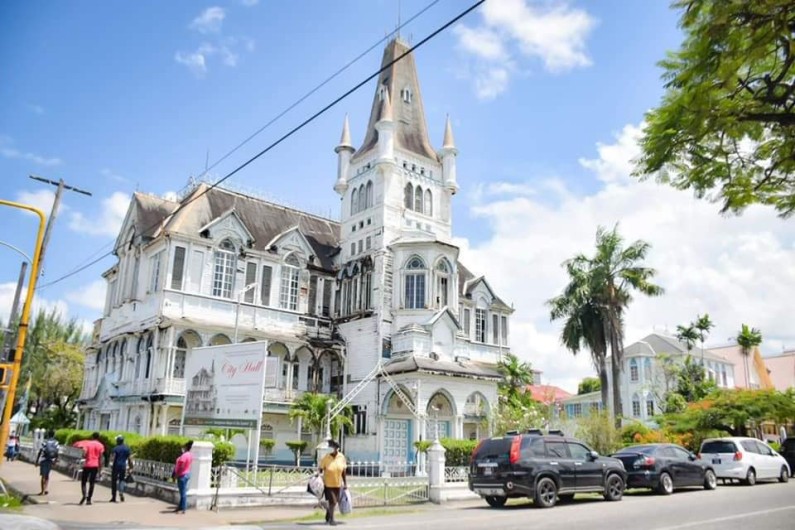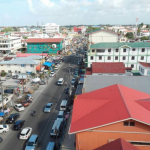
The 2025 Budget for the Georgetown City Council is pegged at $4.2 Billion, but the Municipality is expected to operate at a deficit of $444.9M if the more than $387.6B in outstanding rates and taxes are not paid.
Chairman of the City’s Finance Committee, Councillor Lelon Saul presented the Municipality’s 2025 Budget to the Council on Tuesday.
He anticipates that the Council will rake in approximately $3.8B in revenue for 2025, but said the figure would be much higher if the outstanding rates and taxes are paid. The projected expenditure for 2025 is estimated to be $4.2B, resulting in the net budget deficit of $444.9M.
In an attempt to expand its revenue base, and recoup the outstanding taxes, Saul told the Council that the Municipality will be reviewing and adjusting its tax policies to ensure a fair and competitive tax environment that supports growth and investment.
The 18% interest rate on outstanding taxes will be reviewed, he emphasized. He added that the Council will also pursue grants and funding from the State as well as non-governmental local and international bodies to supplement the City’s budget, even as it considers public-private partnership investment opportunities.
“The Key objective of our budget is to maintain in good order the approximate 645miles drainage network necessary for effectual drainage in the city. Continue reducing mosquito breeding in the streets and approximately 103 miles of alleyways by at least 45%. We do have challenges and some of these things are difficult to attain…but…we will continue to provide the 34,000 plus properties with refuse collection service removing tons of waste daily in the city,” Saul said.
Reflecting on 2024, Saul told the 30-member Council that the work of the Municipality was hampered largely due to lack of funding and manpower, but it did the best it could with the available resources.
“The municipality’s ability to provide core services in 2024 was severely hampered by financial constraints, insufficient manpower, and a lack of materials. Among these, financial limitations were the most critical, as adequate funding is essential for procuring goods and services, as well as recruiting and retaining competent personnel. Recognizing these challenges, the Mayor and City Council implemented several initiatives to expand the municipal revenue base. These measures included proposing an amnesty program for delinquent ratepayers to encourage compliance, regularizing street vending, introducing a system to collect fees for billboard advertising spaces, and reviewing municipal lease agreements. Unfortunately, none of these proposals yielded the desired results,” he explained.
However, he said Central Government, particularly the Ministry of Local Government, strongly opposed the amnesty for delinquent ratepayers, leaving the Council with limited options.
He said to compound the situation, the lack of coordination between municipal departments, which operate in silos rather than collaboratively, has undermined the Council’s efficiency and has also contributed to the loss of revenue.

Citing an example, he said Engineer Department fails to share complete data on billboard installations with the Treasury Department, leading to uncollected fees.
Similarly, he said the Treasury Department lacks a functional system to monitor and track lease agreements, further diminishing municipal income.
Saul also accused Central Government of working against the Council.
“Georgetown is undergoing rapid urbanization, yet the City Council lacks the necessary resources to manage this growth effectively. Compounding this issue is the Central Government’s persistent disregard for the Mayor and City Council, as key decisions and interventions are routinely made without consultation. Such dismissive conduct not only undermines democratic governance but also fosters a hostile and unproductive relationship between the two entities. In a nation like Guyana, which prides itself on democratic values and civil discourse, mutual respect and cooperation should be the foundation of all interactions,” he said.
Saul submitted that effective urban planning for Georgetown cannot occur in isolation. He said for the Council to allocate resources efficiently, it must have timely access to the Central Government’s plans regarding infrastructure, transportation networks, port development, and other critical projects. The Central Government’s reluctance to engage with the Council on these matters is both perplexing and counterproductive, he told the Council.
He warned that by excluding municipal authorities from key discussions, the Central Government weakens local governance and hampers coordinated development.













You must be logged in to post a comment Login